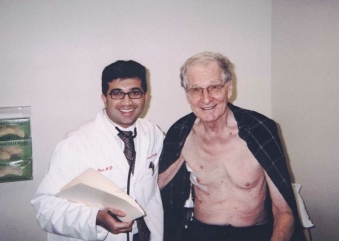Lead Him To Additional Encores
If, during the summer of 2004, you lived in Middlesex County, New Jersey you might have spent a warm afternoon or evening enjoying the upbeat pulsating sounds of Nick Novicky and his Verstyles Polka Band. Or maybe, last December 13, 2004, you spent Tuesday evening at the Manville Public Library where you stuffed yourself with holiday goodies and played games while listening to the songs of the season during Nick Novicky's Holiday Extravaganza.
Although he officially semi-retired in 1999, Nicholas Novicky, age 78, is a busy man. That's why, when in early January of 2005, he sought medical attention from his primary care physician for a nagging pain on his right side and breathing difficulty. He was diagnosed with pneumonia and prescribed antibiotics. When his condition did not improve, he returned to his physician for further evaluation. Concerned his doctor ordered a chest film. Fluid found in the right pleural cavity was drained and sent to the laboratory for cytological testing. The pathologist's diagnosis was mesothelioma.
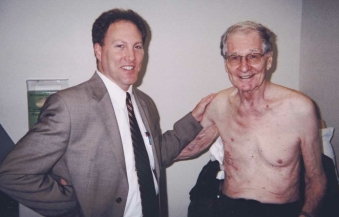
Mesothelioma is not a stranger to the Novicky family. His sister Rosalie, just two years older than Nick, was diagnosed with mesothelioma in 1997. She passed away in the Fall of that year at the age of 72.
The family, knowing this vicious disease frantically began researching treatment options.
One of his daughters, Janice, contacted and spoke with two experts; Dr. David Jablons, a surgical oncologist at Mt. Zion Medical Center/USCF, in San Francisco, California and Dr. Harvey Pass, Professor and Chief, Div. of Thoracic Surgery and Oncology at the NYU School of Medicine and Comprehensive Cancer Center and Chairman of the Science Advisory Board of the Mesothelioma Applied Research Foundation (MARF). He then traveled to Sloan-Kettering Memorial Hospital in New York, New York where he learned that he was eligible for an extra-pleural pneumonectomy (EPP) along with the chemotherapy and radiation protocol. Uncomfortable with such a drastic procedure he continued his treatment search.
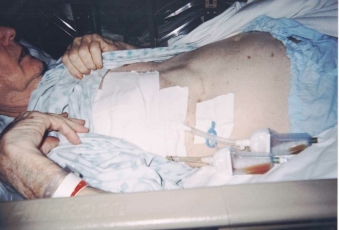
He traveled to Houston, Texas to a clinic that offered alternative treatment. Fearing that his medical insurance would not provide coverage for this type of care, he returned home to continue his search. He found Dr. David Sugarbaker, a thoracic surgeon world renown for his tri-modal therapy approach to treating mesothelioma patients, at Brigham & Women's Hospital in Boston, Massachusetts.
Mr. Novicky met with Dr. Sugarbaker the week of March 21. A bronchoscopy and tissue biopsy was performed. The pathology of the removed tissue confirmed the diagnosis. After review of Mr. Novicky's medical records and examination, Dr. Sugarbaker stated that he believed the tumor was limited to the pleural cavity and that the cancer had not invaded the lymph nodes or other major organs. Because of his age, Dr. Sugarbaker suggested a pleurectomy (removal of tumor and pleural lining, sparing the lung lobes) over an extra-pleural pneumectomy (EPP), if there was no lymph node involvement.
Nicholas completed the several diagnostic tests recommended by Dr. Sugarbaker. The tests showed no evidence that the cancer had spread to his lymph nodes. The MRI showed the tumor to be in the lower right lobe.
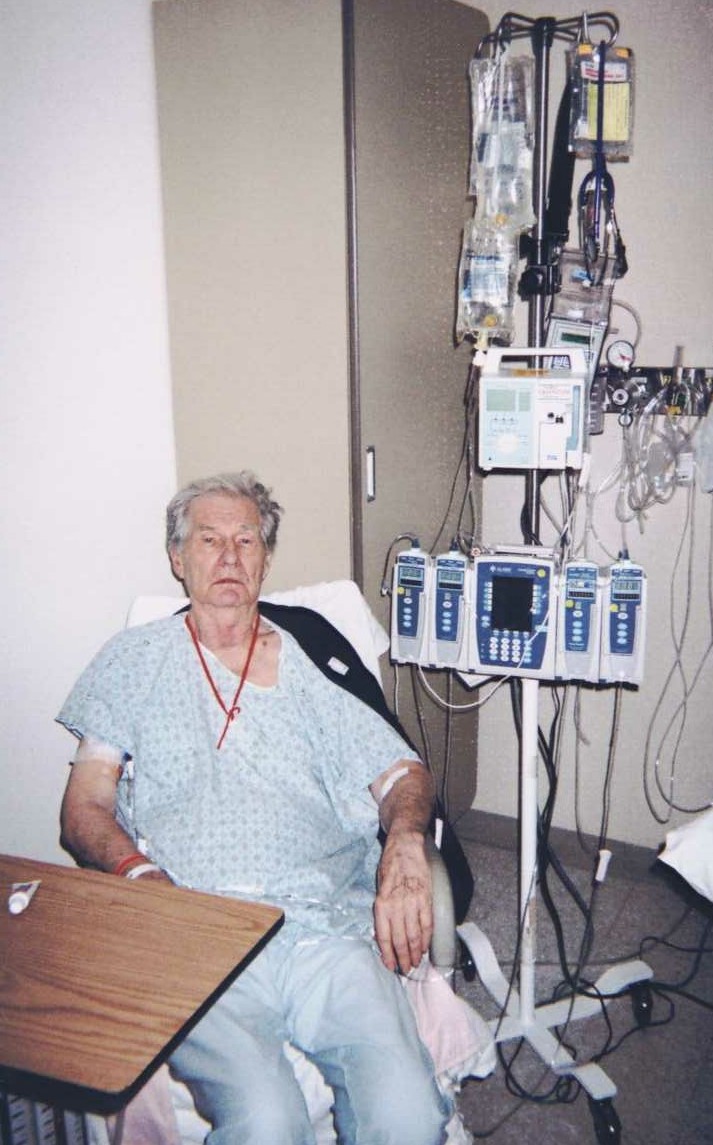
Nicholas, accompanied by his wife Dolores, returned to Boston on Monday, April 25 for the final preoperative tests. On Wednesday, Dr. Sugarbaker performed the pleurectomy, removing the pleural lining and scraping away all visible signs of the tumor. There were no complications during the surgery.
The road to recovery has been intractable. The first two days after surgery, Dolores feared she was going to lose him. Nick's first two weeks of recovery were spent in ICU. His attempts to swallow while drinking or eating caused the food to slip from his esophagus to his pleural cavity. Nick longed for a tall cold glass of ice water, but the feeding tube remained.
Sometime after May 20, he was moved from Brigham & Women's surgical floor to the Youville Rehabilitation Center, a post-surgical nursing facility adjacent to the hospital. This precaution was taken so that he could rebuild his strength before returning home. But further complications forced his return to Brigham & Women's on May 29. He had lost 37 pounds since his surgery, was extremely weak and in agonizing pain. The diagnosis, failure to thrive.
Nick's abdominal pain was the result of poor postoperative intake and elimination. He was put on a nutritional program of Boost with multivitamins, calorie counts and daily weights. An aggressive bowel regimen produced some good results but the KUB (radiographic examination of the kidney, ureter and bladder) revealed a continuous blockage.
After 11 days of intense nursing including physical therapy and a blood transfusion, Nick was discharged from Brigham and Women's back to the Youville Rehabilitation Center.
Slowly Nick regained enough strength to return home. Dolores, in her efforts to put some "meat back on his bones," religiously pumped him with homemade soups and Ensure. Just when he appeared to be making some significant improvement, he suffered another critical set back. His right lung collapsed.
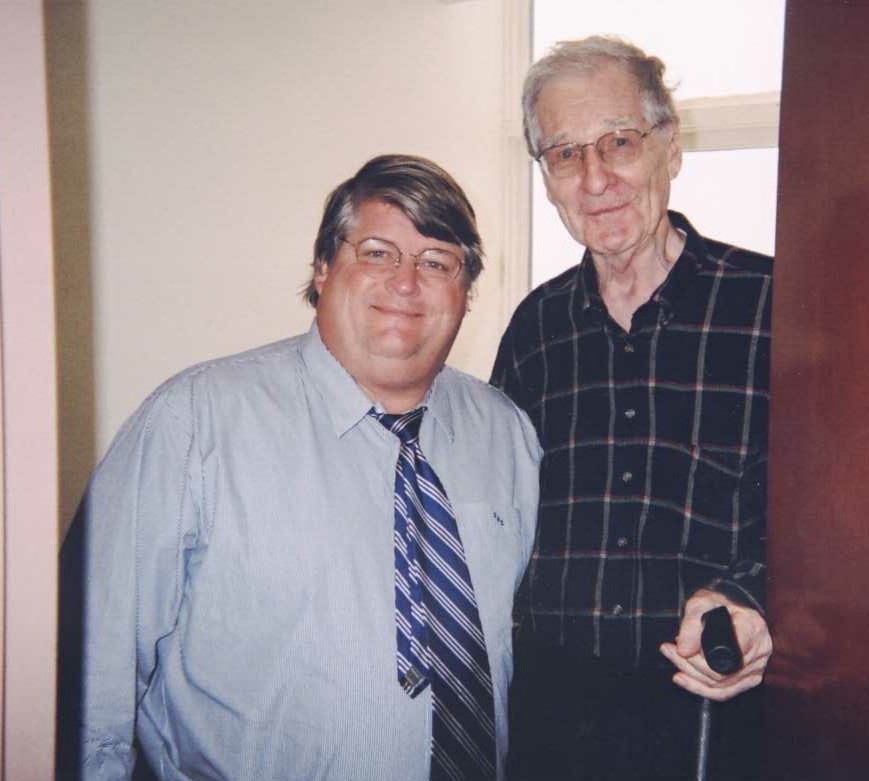
Although hospitalized immediately at his local hospital, their staff felt ill-equipped to care for Nick given his recent surgery and medical history. Using sound judgment, the hospital made arrangements to transport Nick via an ambulance back to Brigham & Women's Hospital on June 27.
The admitting diagnosis was that of Empyema, which is the presence of pus in the body cavity, especially the pleural cavity. Upon admission he received two units of blood packed with red blood cells. A CT scan of the chest showed a collection of loculated fluid in the right hemithorax. The testing of that fluid showed a methicillin resistant staph aureus (MRSA). In other words, Nick had developed a bacterial infection in his pleural cavity that is often found in food poisoning and boils. A chest tube was placed and Infectious Disease was consulted. It was determined that he should continue to receive vancomycin to fight the infection.
On top of all his physical problems, Nick was suffering from depression and severe anxiety. After a psychological consultation he was prescribed Lexapro. An increase in the level of his creatinine prompted a change in his antibiotic to that of linezolid. With continued nursing support, nutritional supplementation and physical therapy, Nick steadily improved and was released to the Youville Rehabilitation Center on July 13, 2005. Nick remained at Youville until Dr. Sugarbaker felt he was strong enough to return home.
Throughout his hospitalization and rehabilitation Dolores and his daughters kept a constant vigil by his side. Nick strongly believes that their faith and love gave him the strength to survive.
Nick, our prayers and thoughts are with you and your family.
In 1969, Nicholas J. Novicky, an accomplished accordion artist, wrote the music and words to "Asbestos City, USA," a polka that celebrated the hardworking people and prosperity of Manville, New Jersey, home of the Johns-Manville Corporation for 74 years. The lyrics are as follows:
Asbestos City USA
Where people work hard
to earn their pay
The grass grows green here
the skies are blue
Asbestos City - We're all for you
Well Manville is the city's name
Johns Manville products
have brought it fame
The girls are pretty
and friendly too
Asbestos City - We salute you
The people came from everywhere
From Pennsylvania and Delaware
From New York City - Chicago too
Asbestos City - Hello to you
You've heard our story
About our town
So why not stop in
And look around
In central Jersey not far away
Come visit Manville
You'll want to stay
Come visit Manville
You'll want to stay
*** POSTED ON DECEMBER 28, 2005 ***
An Update - 9/26/06
Nicholas recently completed his chemotherapy this past March (2006) and did not suffer any major side effects from that. He feels himself slowly getting stronger but is still battling with shortness of breath, especially after exerting himself.
He cannot walk as far as he's used to without gasping for air. So, he has to make use of a wheelchair. He is waiting for a ramp to be built, which will give him more mobility in and out of the home. Right now, Nick's focused on Dolores and her health issues, some of which developed from her own chemotherapy.
Mr. Novicky passed away on February 8, 2007

